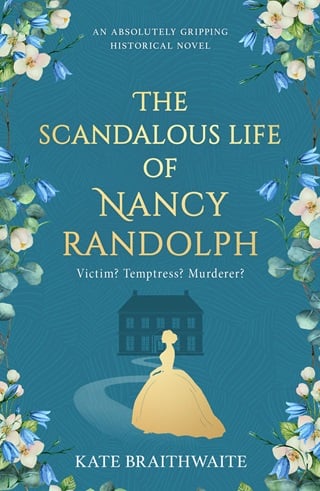Chapter Thirty-Three
Judy bore the journey as well as she could. Nancy's letters had charted the story of Tudor's decline. They'd brought in the best doctor in New York City, but the situation was grave. Nancy also wrote to Mr. Tucker, and as a result, Judy was able to travel north in the Tucker family carriage, with Mr. Tucker paying for her horses and lodgings on the road. By the time she arrived at Morrisania, nearly a month had passed since Tudor's consumptive attack. She passed the hours of the long journey vacillating between hope and despair, longing and dreading to see him, praying for divine help to keep her precious son alive.
There was no time for any impressions of place or people when she arrived. The carriage drew up at a door. She climbed out. There was her sister. Hands were outstretched and clasped. She registered tremulous smiles and words of reassurance. Judy was swept through a hallway, up a flight of stairs, past many doors and then into the sight of her adored son — alive, in bed — upright, horribly thin, pale — but awake, happy to see her, ready to be embraced. Tears filled her eyes, and she saw them mirrored in her sister's. As if they sensed her need for privacy, she heard Nancy and Mr. Morris step away and the door close. She sat in the chair next to her son's bed and held his hand. Soon enough, he closed his eyes and slept.
The next morning, Judy was better able to take in her surroundings. She woke in a warm bed hung with blue and white cotton curtains, an elaborate and expensive canopy of swags of rich material that matched her bedspread and cushions. The room was decorated with blue wallpaper, thick rugs, a beautiful walnut desk and two newly upholstered armchairs arranged around the corner fireplace. A vase of white chrysanthemums sat on a small table by the window, next to a bowl and pitcher. Everything was clean and as neat as a pin — as fine as anything she had seen at Monticello or remembered from grander days in Tuckahoe and Matoax. If Tudor had to fall ill, Judy was truly thankful it had been here, at Morrisania, with family to look after him and every creature comfort available. The thought of him suffering in some miserable room in Harvard, with no one to look in on him or light him a fire, had tormented her since he left Bizarre. Now, she gave a prayer of thanks that in his lowest moment, his family was able to support him.
Family. Judy, with a good night's sleep under her belt and assured by her own eyes that Tudor was not at death's door, was ready, anxious even, to meet properly with Mr. Morris, Nancy and little Gouverneur. Just as she finished dressing, a maid knocked at her door, delivering hot water and returning a few minutes later to conduct her to the breakfast parlor.
Mr. Morris was at the table, tucking into a dish of eggs with the newspaper propped against the teapot and his chair set at an angle from the table that allowed him to straighten out his wooden leg. She was surprised at how nimbly he rose to his feet as she entered and smiled in response to his own beaming welcome. Seeing Nancy also start to rise, Judy put out her hands in protest.
"No. Pray do not disturb yourself." The small boy on Nancy's knee turned to gaze at her, a fistful of toasted bread and butter halfway between his mother's plate and his pink mouth. "Hello, young man," she said. A memory of Tudor at the same age flooded her mind. Perhaps it was the way his back curled into his mother so that they fit each other and were separate, yet not separate.
"I was with Tudor earlier," Nancy said. "He slept well and may be strong enough to leave his room for a few hours this afternoon. I think you might sit with him in the rose garden. The sun lasts longest there, and a line of trees keeps any wind out."
"I'll look forward to that." Judy allowed herself to be ushered to a chair by a manservant. "It is lovely to meet you, Mr. Morris. And your fine young son."
She had been nervous of meeting Nancy's husband, but quickly forgot all that. He was an affable and solicitous host who spoke warmly of his belief that Tudor was on the mend and waved away her profuse thanks for his kindness to her son. Later, she sat quietly in the rose garden with Tudor, enjoying the late summer sun warming her skin. For the next two weeks, she had nothing to do but concentrate on helping her son recover his strength. The sisters were comfortable together, conversing about Tudor's needs, reminiscing about his childhood exploits and entertaining Gouverneur.
And then Jack came.
* * *
Nancy wasn't worried. Jack had been friendly enough in Washington a few years previously, and anyone could see that his much-loved nephew was on the mend. Past days of bickering between herself, Judy and Jack seemed like memories belonging to other people. She was pleasantly surprised at how comfortably she and Judy managed together and sorry she and Tudor would leave them in a few days' time. Difficult subjects — any mention of Dick, Saint or the burning of Bizarre — were avoided, and Mr. Morris had the happy knack of charming any visitor. She enjoyed watching Judy unbend in the face of his unremitting good manners and gentle optimism. A brief visit from Jack would seal the end to the breach in the family. As she picked up Gouverneur's toys from a rug in the garden and waited for Judy to join her for tea, she imagined she'd soon have the pleasure of thinking her family preferable to her husband's. His nephews and nieces were less than delighted with Mr. Morris's late marriage. After their son's birth, relationships had deteriorated markedly. Nancy's Randolph relations were starting to look a lot more palatable than the Morris clan. Would wonders never cease?
But within an hour of his arrival, Nancy knew herself mistaken. Jack swaggered into the house, filling first the hallway and later the dining room with his exaggerated presence. Of course, he looked as rustic as ever, deliberately disheveled and wearing a ridiculous planter's hat — pretending he spent his days on the tobacco field when the world knew he was the busiest of congressmen, ready to ally with anyone rather than risk losing his precious seat again, as he'd briefly done back in 1812. As soon as Jack was reassured about Tudor's health, he turned his attention to his surroundings. He admired anything and everything to the most uncomfortable degree and — worse — called upon Judy to agree with him. Nothing went unremarked, from their paintings and china to their silverware and table linen. He was certain he'd seen nothing so fine in all Virginia.
"Did you spend much time at your summer house this year?" Jack asked her the next day. They were outside. Tudor, for the first time fully dressed and seated without any blankets, had managed to walk out to the lawn on his uncle's arm looking considerably more like the fashionable young man who had arrived two months previously. Judy tried to fuss around him but subsided as her son glared, muttering that he wasn't an infant and could reach for his own teacup when he wanted it. Under Phebe's watchful eye, Gouverneur, busy with a butterfly net, happily stumbled around, offering no threat to the insect population but entertaining his mother a great deal with his enthusiasm. Mr. Morris had not joined them — a fact for which Nancy was shortly most thankful.
"Not so much as in previous years," she replied. "With Gouverneur starting to walk, we agreed staying home was safer. Besides, it's a long way in the north, and traveling with infants is not always easy." She threw Judy a speaking glance, mother to mother.
Jack sniffed loudly. "It must be pleasant, I suppose, to have such amenities at your disposal. Imagine, Tudor, how your mother might benefit from having a second property — oh, no, wait. To have a second property, one would be required to have a first."
"Jack!" said Judy.
"Because it does rather put it all into perspective, doesn't it?" he said.
"Does it?" Nancy glanced at her son, confirming he was out of earshot.
"Of course, I can only speak for myself," he continued. "But seeing you here, so comfortable and at your ease . . . It's quite remarkable when you come to recall—"
"This is my home, Jack Randolph. Did you think to see me uncomfortable?"
"Do you know, I suppose now that you say that, that I rather did. Was it difficult, I wonder, to move from housekeeper to wife?" He glared now, openly hostile. "Or perhaps not. Perhaps you came here with that end in mind. Eased your way into the old man's affections, teased him, tempted him. Used your experience."
"Jack!" She was on her feet, looking from Jack to Tudor and to Judy. "How dare you speak in such a manner? And in front of our nephew."
"Tudor? Oh, he's familiar with your history. He's an adult. Besides, there are lessons he can learn from you. You're a survivor, Nancy, I'll give you that. But I do feel pity for your poor sister, forced to sit here and take your charity."
"That's enough, Jack." Judy had been staring at her lap, but now, she whipped her head up and turned on him. "More than enough. Sister, I hope you'll ignore that unseemly outburst. You've been a nurse to my child and a generous host to us both. Jack Randolph does not speak for me." She rose, nodded at Nancy and walked across the grass to Gouverneur.
Nancy watched her sister and her son and knew a rush of gratitude, but Jack's insults could not be ignored. She felt a fool, suddenly, standing there with her fists clenched while Jack languished in his chair. She turned to her nephew. "Tudor?"
The young man's eyes flicked between her and his uncle. He seemed to be turning over a range of answers in his mind, perhaps weighing which one of them it suited him best to side with. She could make that calculation for him, and her heart sank.
"Enough men marry for money, Uncle Jack," he said. "Why shouldn't women?"
This had gone far enough. "I don't know what your uncle may have told you, Tudor, but I ask you to consider the time you have spent here and what you know of your host, Mr. Morris. He is not a fool. He is not an old man, hoodwinked by a young woman casting out lures in return for a fortune. He is intelligent, thoughtful, kind." Her voice wavered. "He has been a generous host to you. You should speak to me as you would speak if my husband were standing here by my side. Your father would not tolerate such disrespect."
"My brother!" Mention of Dick was a flame on dry paper. Jack jumped to his feet. "You don't speak his name. Do you hear me? You do not."
She remembered his cruelty in Richmond. Nothing had changed. Perhaps for Jack, it never would. "You will leave, Jack Randolph. You will pack your bags and go. I will tell my husband you were called away on business."
For a few moments, they stared at each other. She was aware of Tudor, eagerly drinking in the standoff. His ingratitude dismayed her.
Jack slowly nodded. He pressed his lips together. "Very well. I will call for my horse. It has been instructive to see you here, in this new setting." He sounded calm. The storm in his eyes when he spoke of Dick had passed and appeared forgotten, but she knew better than to judge Jack by his demeanor. "Tudor. Come and see me in the city with your mother before she returns to Virginia," Jack said. "We have much to discuss."
She watched him walk back to the house and fought to steady her breathing as she lowered herself back into her chair.
"Well, Aunt," said Tudor, after a few minutes. "You quite bested him there. I almost thought he'd strike you at one point."
"Did you, Tudor? And would you have found that as amusing as all the rest?"
"Oh, don't be upset with me! You know I mustn't cross Uncle Jack." He stretched out a hand, and she let him pat hers while biting the inside of her cheek. He smiled, and she saw the boy he had been and, in many ways, still was. Her anger dissipated — replaced by gratitude that Jack was gone, that Mr. Morris had heard none of it and, for once, her sister, Judy, had sided with her. She was rattled, but not about to let her nephew see how badly.
"Let us not speak of it, Tudor. But I promise you, if I ever set eyes on that uncle of yours again, it will be too soon."
* * *
Judy closed her eyes in the coach, surprised by the strength of her emotions as she said farewell to Nancy. So much history lay between them, but in these past few weeks, they'd been something like friends. Nancy had cared for Tudor as well as if he were her own. It meant a great deal. And when Judy looked back on those years at Bizarre after Dick died, she saw how generous Nancy had been to her nephews with her time, her affection and her care. At the time, Nancy's efforts with Saint had rankled. Judy suspected her of what? Trying to impress Dick with her care for his damaged son? Trying to make her son love her, Nancy, more than his own mother? In the years after Dick's death, Judy viewed Nancy's closeness with Tom and William in the same light of competition. Now, she wondered if she had been wrong. From the few comments Nancy let drop, Judy understood life had been hard after she left Bizarre, much harder than Judy's own life now, never mind Jack's ridiculous harping. Nancy had been wholly dependent on Tom and William until Morris rescued her. Rescue was the term Nancy used, and although she said it lightly, Judy heard the undercurrent of seriousness in her voice.
Jack wanted Judy to be envious of Nancy's new life, that was clear. Well, Jack would be disappointed, and she'd tell him so when she and Tudor met up with him in New York City in an hour or so. Because Judy was not envious of Nancy now.
She might have been, she knew. Jack's comparisons were valid. Nancy lived in comfort and luxury with a husband who adored her and a child with as sunny a temperament as any child Judy had met. But coveting what Nancy had served no one. Nancy having less wouldn't give Judy more. It was Nancy's good fortune that had saved Tudor, and there was nothing — nothing — more valuable than her son, for all his faults.
Was it possible to put aside those years before and after Dick's death? Years of disgrace, of suspicion and doubt. In her mind, she tried to hold up two images of Nancy, side by side. On the one side, the Nancy of today. A mother, kind-hearted and generous. Content. On the other side, the sister she remembered when she first came to Bizarre: lively, idealistic, flirtatious, bold. Falling in love with Theo Randolph, or so she had claimed. The rot of Glentivar had eaten at Judy. She remembered the letter, torn in two, fluttering in the air as Dick cast it from that bridge in Providence Forge. She remembered the ring swinging on a chain around her sister's neck, the one Judy never admitted noticing. Nancy didn't wear it now. At Morrisania, her sister wore little jewelry and nothing Judy recognized. For years, Judy had struggled to maintain her belief that there was nothing between her husband and her sister. Nancy's letter from the road to Newport had finally given her a level of peace. Theo, not Dick. Nothing else mattered.
Prayer gave her strength. She opened her eyes and looked at the motley cluster of houses as they passed. Roads narrowed, and the smells of the city assailed her — horse manure and wood burning, burned fat and coffee — as they stopped and started the last mile into the city. Tudor continued to sleep. He looked so innocent, not so different from his infant self, with his mouth relaxed instead of twisted in jest or cruelty. He didn't want to return to Farmville with her, but how could he manage at Harvard or travel abroad with his health so precarious? She thought of her small rooms at Farmville, leased through the Christian goodness of Reverend Rice. There wasn't much she could offer her son beyond care and affection. It was Jack he looked to for direction and funds. The most she could do for Tudor now, was to not be a burden. Thinking this way hurt more than a little. But as Reverend Rice said, prayer brought peace, and God was always with her. Prayer had sustained her through the loss of Bizarre and through the decision to send Saint to Philadelphia. It would help her now, to countenance returning to Virginia alone, leaving Tudor in his uncle's care.
Hopefully, Jack would be in a better frame of mind than when he left Morrisania. Nancy's expression when Jack accused her of marrying Morris for his money flashed across her mind. Judy had failed to support her sister in the face of Jack's accusations in the past, but not this time.
 Fullepub
Fullepub 



